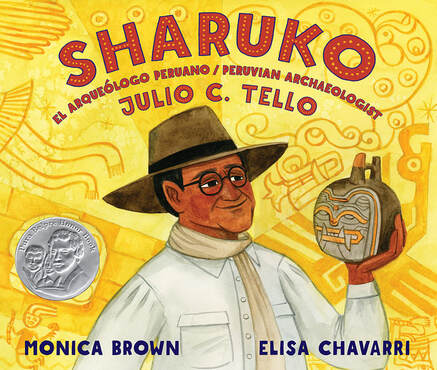By Amina Chaudhri and Julie Waugh, on behalf of The Biography Clearinghouse One of the most profoundly devastating schemes of the colonial project was to erase Indigenous knowledge: religious, intellectual, social, cultural, aesthetic, scientific. In the Afterword of Sharuko, Monica Brown extends readers’ knowledge of the importance of Julio C. Tello’s work as an archaeologist in undoing the damage of colonial erasure. He spent his life raising awareness about Indigenous Peruvian ways of knowing, as evidenced by his research. Julio C. Tello was Indigenous and spoke Quechua, so his investment in countering the dominant narrative was personal as well as professional. Today, he is a celebrated figure in Peru, and through Sharuko, young readers can come to value his accomplishments as well. This entry of The Biography Clearinghouse offers a variety of teaching and learning experiences to use with Sharuko: el Arqueólogo Peruano/Peruvian Archaeologist, a bilingual biography of Julio C. Tello, written by Monica Brown, and illustrated by Elisa Chavarri. In addition to a recorded interview with the author in which she discusses her research process and the craft of creating picturebook biographies, we include suggestions for learning about Peruvian textiles, the Quechua language, and variations on the trait of bravery. Below are two ideas inspired by Sharuko. Connecting the Past and the Present Sharuko is the biography of a man who lived from 1880 - 1947, yet his work as an archeologist and conservationist is relevant today. His legacy includes the Museum of Anthropology, in Lima Peru, that houses the artifacts he discovered and wrote about. His research spotlights the accomplishments of Indigenous Peruvians and tells the story of Peru’s past that colonialism tried to erase. In her interview, Monica Brown tells us about a “magic moment” in the process of creating this book, in which she imagined a Quechua word - sharuko- emblazoned across the front as its title. In this way she continues Tello’s legacy, using her privilege as an established writer to highlight the Quechua language and the contributions Tello, an Indigenous scholar, made to the world. Begin by reading Sharuko aloud with students, inviting them to note the chronology of his life, from boy to researcher, the people who supported him along the way, and his connections to history as depicted in the text and images. In analyzing this biography, teachers might scaffold students’ understandings of:
Thinking Like an Archeologist Sharing Sharuko can provide a similar introduction to the complexities and exciting puzzles that define the field of archeology. Archeology is about telling the human story. Invite your students to act as archeologists, researching, writing, and considering the different perspectives that inform archeological work. Teachers can find teaching ideas related to archeology on the website of The Society of American Archeology. The teaching and learning suggestions below are designed for teachers to plan experiences that involve thinking like an archeologist:
For more teaching and learning suggestions, visit the complete entry on Sharuko, on The Biography Clearinghouse website. Amina Chaudhri is an associate professor at Northeastern Illinois University in Chicago, where she teaches courses in children's literature, literacy, and social studies. She is a reviewer for Booklist and a former committee member of NCTE's Orbis Pictus Award for Outstanding Nonfiction for Children. Julie Waugh shares a 4th grade teaching position at Zaharis Elementary in Mesa, AZ and serves as an Inquiry Coach for Mesa Public Schools. She delights in the company of children surrounded and inspired by books. A longtime member of NCTE, and an enthusiastic newer member of CLA, Julie is a former committee member of NCTE's Orbis Pictus Award for Outstanding Nonfiction for Children. |
Authors:
|
CLA
About CLA
|
Journal of Children's Literature
Write for JCL
|
ResourcesCLA-sponsored NCTE Position Statements
|
Members-Only Content
CLA Video Library
|
© COPYRIGHT 2018.
ALL RIGHTS RESERVED |

 RSS Feed
RSS Feed